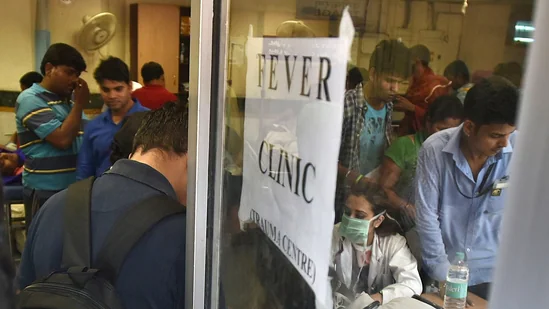Delhi: Hospital beds filling up as Dengue cases cross 1000 mark
Doctors have reported up to over 60% increase in the number of cases over the last month.

After a brutal second wave of the Coronavirus, the capital is now witnessing rapid filling up of hospital beds again as dengue cases in Delhi cross the 1000 mark this week with 665 cases recorded in October alone. This, is by far the highest number of cases recorded in a month this year.
Doctors have reported an over 60% increase in the number of cases over the last month which has led to fever beds in hospitals filling up. Last week itself, 283 cases were recorded in the city.
According to Dr Suranjit Chaterjee, senior consultant of internal medicine at Indraprastha Apollo hospital nearly one-third of the admissions are currently dengue patients. “There has been a 30-40% increase in the last two weeks in the number of dengue cases we are seeing”, he said.
Seeing this spike in cases, the Delhi government has now reduced the number of beds earmarked for Covid-19 in private hospitals from 30% to 10% last week, with the extra beds to be used to treat dengue and other fever patients. So far this year, Delhi has seen only one death due to the infection, which happened in late September
“There has been an increase in the number of dengue patients. We are admitting 5-10 patients daily. There are some cases of other viral fevers, and malaria and chikungunya as well. We have set up a fever clinic from where the patients are referred to the 100-bed fever ward. Currently, the ward is half full. If there is a need, the number of beds will be increased,” said a senior doctor from Lok Nayak Hospital where 400 beds are currently on hold for Covid-19 and 100 beds for the treatment of fever patients.
It is worth mentioning that October is the month that the city sees the highest number of dengue cases each year – 346 cases of dengue were reported in October last year, accounting for 32.2% of the cases reported in the entire year; 787 cases (38.6%) in 2019; and 1,114 cases (39.8%) in 2018.
Dengue mosquito larvae breed in clear, standing water, while those of malaria thrive even in dirty water. It begins with high fever which when starts to abate is often followed by a decrease in platelets. Food items such as wheatgrass, papaya leaves, raisins, Vitamin-C rich foods are known to be effective at increasing platelet count.
Cases of vector-borne diseases are usually reported between July and November, but the period may stretch till mid-December.



